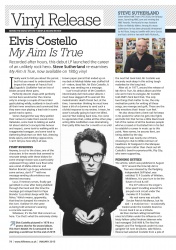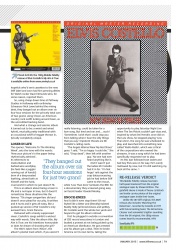Hi-Fi News & Record Review, January 2015: Difference between revisions
(start page) |
(+text part 2) |
||
| Line 14: | Line 14: | ||
Perfectly decent chaps with perfectly normal lives would enter the cinema only to emerge a couple of hours later gesticulating wildly, suddenly in touch with all their inner emotions and convinced that they were now playing a lead role in some grand macho opera. | Perfectly decent chaps with perfectly normal lives would enter the cinema only to emerge a couple of hours later gesticulating wildly, suddenly in touch with all their inner emotions and convinced that they were now playing a lead role in some grand macho opera. | ||
Some changed the way they spelled their names to make them sound more Italianate, some took to talking an awful lot about abstract concepts like honour and respect, some took to walking with an exaggerated swagger, and some took to slathering Brylcream on their hair, dressing kinda spivvy and drinking cappuccinos. I can't tell you how silly it all was. | |||
<!-- | <!-- | ||
FISHY BUSINESS | |||
--> | |||
Anyway, to cut to the chase, one of the characters in the movie that seemed to resonate deeply with these blokes for some strange reason was a particularly unpleasant thug called Luca Brazi who was a kind of Mafia enforcer and Marlon Brando's go-to guy whenever some serious, don't-f***-with-me message-sending ultra-violence was deemed necessary. | |||
Luca, if memory serves, finally got garrotted in a bar after being stabbed through the hand and this time the message got relayed ''back'' to Papa Brando: "Luca Brazi sleeps with the fishes." Which means, apparently, that they've dumped his remains in the river. I believe it's the same as being told someone's wearing a concrete overcoat. | |||
Whatever, it's the fish that concern us | |||
here. 'Cos that's what the extremely stinky brown paper parcel that ended up on my desk at ''Melody Maker'' was stuffed full | |||
of — rotten, dead fish. Mr Elvis Costello, it seems, was sending me a message. | |||
I can’t recall which of Mr Costello’s interminably dull mid-career albums I must have slagged off to warrant this melodramatic death threat but, at the time, I remember thinking he must have been a bit of a dummy to send such a clichéd response to my review. I mean, he wasn’t actually going to have me killed, was he? But looking back now, I’ve come to appreciate that, unlike all the other playacting little Godfathers over-dramatising their petty little lives for a month or so until the next fad took hold, Mr Costello was sincerely neck-deep in this acting tough malarkey for the long haul. | |||
After all, in 1977, around the release of ''My Aim Is True'', his debut album and the one we’re here to eulogise, Mr Costello | |||
told ''NME'''s Nick Kent that, "the only two things that matter to me, the only motivation points for writing all these songs, are revenge and guilt. Those are the only emotions that I know I can feel." | |||
I | |||
He also shows Kent a bent nail he keeps in his pocket for when he gets into fights and tells him that he has a little black book | |||
full of the names of all the business people who’ve crossed or frustrated him in his bid to establish a career in music up to this | |||
point. New names, he assures Kent, are being added by the day. | |||
And Kent was nearly one of them, choosing to chat to Wilko Johnson of headliners Dr Feelgood in the Marquee dressing room rather than check out Mr Costello’s band-in-a-previous-life, Flip City, who were supporting. | |||
<!-- | |||
PENNING DITTIES | |||
--> | --> | ||
The [[New Musical Express, August 27, 1977|article]], which was published in August 1977 around the time ''My Aim Is True'' was released by the fledgling independent Stiff label, was entitled: "D{{nb}}P Costello of Whitten, Middlesex, it is your turn to be the future of rock & roll." | |||
The D{{nb}}P refers to the singer’s time spent trundling around the pre-pub rock circuit under the | |||
moniker D{{nb}}P Costello. | |||
His real name was actually Declan Patrick McManus, but his dad – a musician too – occasionally | |||
traded under the Costello brand so | |||
his son took it on as a tribute. | |||
He then started calling himself Elvis once he’d fallen under the influence of a feisty fellow called Andrew Jakeman who had managed Chili Willi & The Red Hot Peppers and The Feelgoods under his own gangster-ish nom de plume, Jake Riviera. | |||
Riviera had selected Costello from a pile of | |||
{{cx}} | {{cx}} | ||
{{rttc}} | {{rttc}} | ||
{{Bibliography notes header}} | {{Bibliography notes header}} | ||
Revision as of 18:24, 15 February 2015
|



